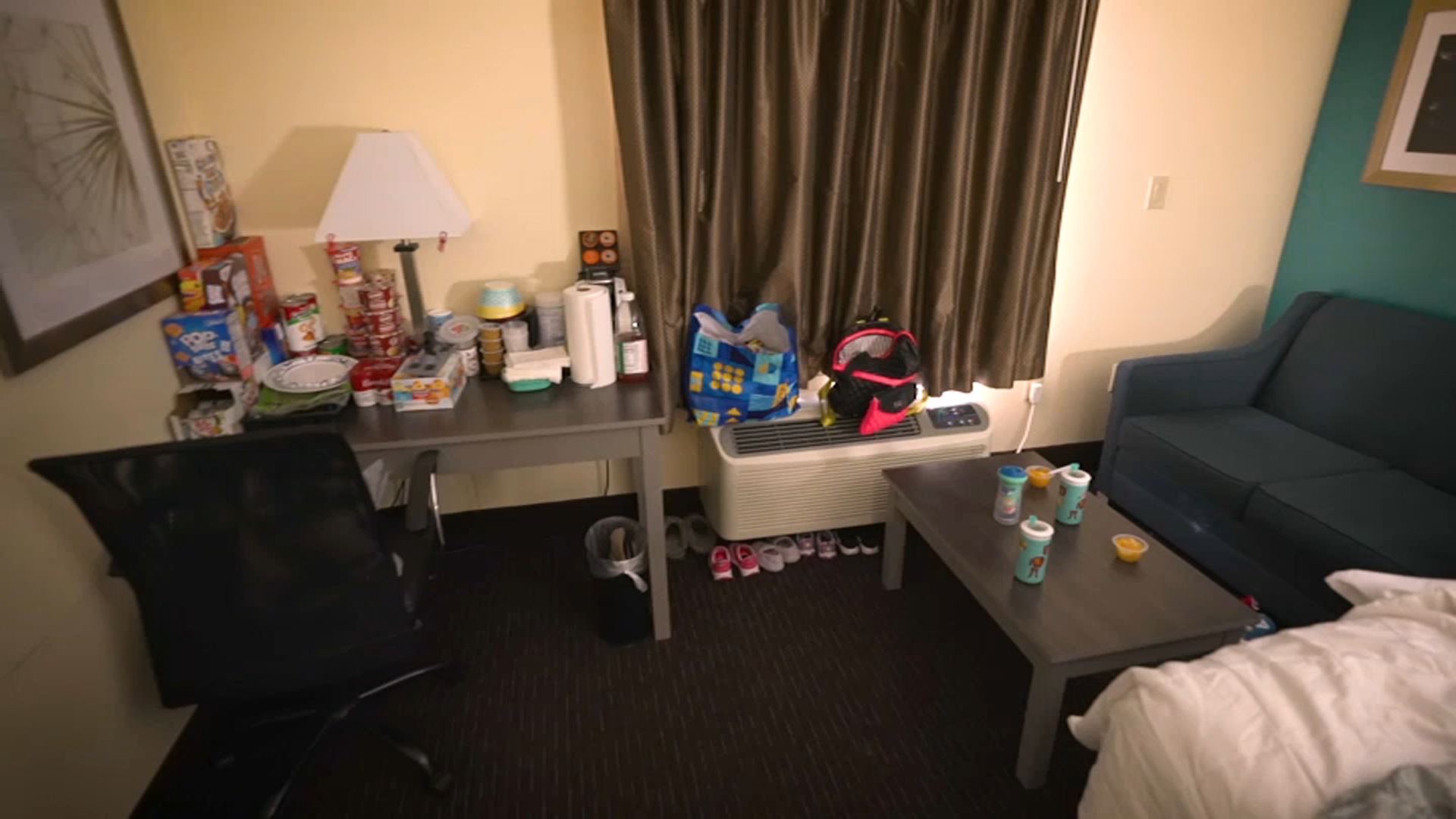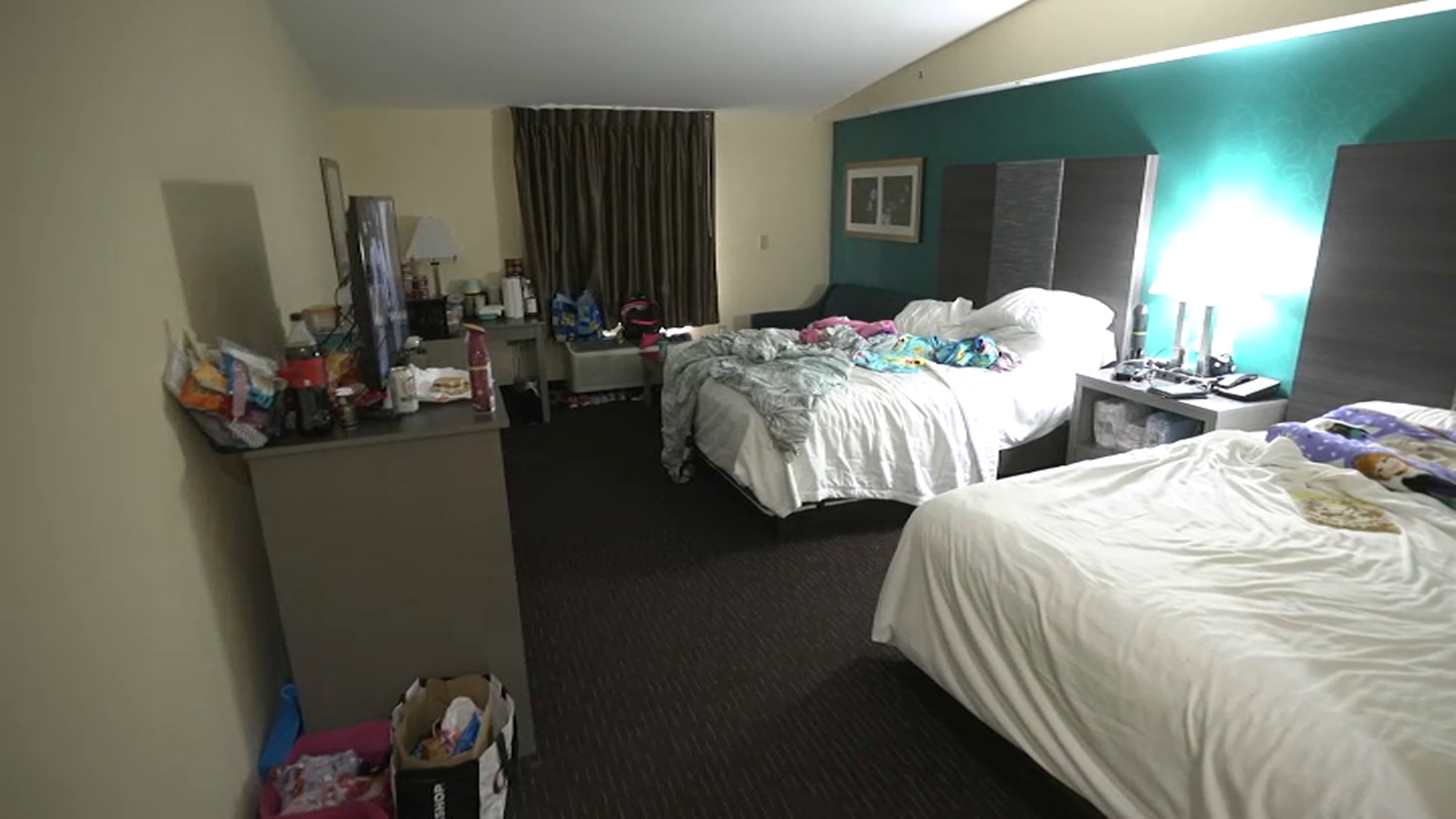On a cold morning in Lowell, Massachusetts, outreach worker Alex Medina walks along the banks of the Merrimack River looking for familiar faces.
He walks up a hill into a wooded area with multiple tents. For some of the folks out there, he’s the closest thing they have to a support system.
Medina visits almost a dozen of these homeless encampments across the city each week. In addition to normal supplies (blankets, socks and food), he also picks up used syringes and hands out harm-reduction supplies like wound kits. The wound kits are especially needed with xylazine prevalent in the drug supply.
“Anyone home? It's Alex from Life Connections," Medina yelled into a tent.
Get New England news, weather forecasts and entertainment stories to your inbox. Sign up for NECN newsletters.
From another tent someone calls back, “You have any garbage bags?”
Medina doesn’t, but hands out socks to the people inside.
“A lot of folks may have burned their bridges with families and are no longer able to stay there,” Medina explained.
NBC10 Boston met Flacco, a Lowell native who originates from Puerto Rico, at the camp. He showed us around his tent which he said he moved into last fall.
“We got our heater, we got a stove. We got a pretty nice hotel,” he said.

When we first visited this camp in early March, there was still snow on the ground.
“Try living in your icebox for a week, dude," said Robert Waylein. “That's what it's like living in the winter out here. Live in your freezer for a week.”
This is Waylein’s camp and he claims he’s been living here along the banks of the Merrimack for a decade. Like many in the camp, he’s been unable to find a stable job but not for lack of trying.
“We actually look for jobs every day and do the right thing. But it's hard to get a job with a two-time convicted felon,” Waylein said.
In another part of Lowell, underneath a bridge is an encampment of Cambodian immigrants. We meet Sarom Heak outside her tent where a fire is burning. Heak said her monthly disability check is not enough to cover rent in Lowell. So she and her husband have been living here for the last few months. She said on a good day they laugh and cook out.
On a bad day…
“Bad people come and interrupt me, that's bad. Especially in the middle of the night when you sleep, you know, at midnight, 3 a.m. in the morning. You try to sleep, and then they come in then rob us for our food,” Heak said.
We met Ann Isler-Korbaj at a local outreach center in Lowell. She showed us a cart filled with supplies.
“This is some clothes and food and my snowsuit. So I don't freeze," she said.
Isler-Korbaj said was forced to leave a local motel she’d been living in since December because of a disagreement with another resident. She was moving into a tent in another encampment along the river that day.
“I got a Section 8 voucher. But it's been very difficult because of past rental history and owning a house. Financially, I lost my way,” Isler-Korbaj said. “But a lot of landlords don't want to hear your background and your sob story. They want to get paid money.”
A grandmother of 12 and disabled, Isler-Korbaj is now part of an exploding homeless population here in Massachusetts living in encampments.

“It's become a real crisis," said Leah Bradley, CEO of the Central Mass Housing Alliance.
Bradley said they’ve seen a 46% increase in homelessness across Worcester County in the past few years.
According to data released by the Department of Housing and Urban Development, since the COVID-19 pandemic started the unhoused population living in shelters has gone down, while the unsheltered population has gone up.
Those numbers were released for 2022 and the survey was taken last January.
Bradley and people from other outreach organizations around the state say the unhoused population has only grown. Those numbers were taken this January and won’t be released until later this year.
“There's an increase not only in the city of Worcester and Fitchburg and Leominster, but there's also an increase in some of the smaller communities,” Bradley said. “And it's really because folks just can't afford housing anymore.”
We met Bradley in a small town in Worcester County that she said has seen an influx of people living in the woods. She said they do a good job of staying out of sight, but will routinely show up at the local hospital.
“They'll show up at libraries, at community centers. And also often the police departments are familiar with the folks that are living outdoors. And they've been tremendous partners in these communities and really helping us to connect folks with services,” she said.
Bradley added most of them have jobs, but can’t afford rent and want to stay in their communities.
According to the Central Mass Housing Alliance, about 76% of people who have experienced homelessness in the last year are newly unhoused. Finding housing in the region is nearly impossible. According to the U.S. Census, Massachusetts has the lowest rental vacancy rate in the country at only 2.8%.
It’s also one of the most expensive places to live. According to HUD, the average monthly rent for a studio apartment in the Boston metropolitan area is $2,025 a month. That’s up by more than $400 dollars in just four years.
Simply put, there's a housing crisis.
Gov. Maura Healey on the housing crisis
“We need to see communities, whether it's at the state level or local level, really addressing zoning restrictions and loosening their zoning so that the development of housing can be improved so that developers are able to create deeply affordable housing,” said Carl Howell, the chief program officer at Community Teamwork or CTI.
CTI serves 72 communities in Essex and Middlesex counties, including Lowell.
In Massachusetts, the law states that all families must be sheltered. But not everyone has kids, and Howell said it’s nearly impossible to find single-occupancy housing for unhoused individuals.
“We can't just have high-rise apartment buildings that are above market. We also need to layer in deep affordable housing as well,” he said.
Over the last couple of years CTI has been working with the city of Lowell to create more low-threshold permanent housing for people experiencing homelessness. This summer 19 units will come online bringing their total to more than 50. But there are an estimated 300 unhoused people just in Lowell.

“My next purchase, honestly, is a toilet seat cover for that bucket. And people don't think like that. But you have to. I mean, here I am disabled, trying to get up off of a bucket to go to the bathroom,” Isler-Korbaj said.
That’s just one alarming truth about living outdoors.
When we visited her campsite a second time the wind was howling. Her tent is partially collapsed, covered in tarps and held together by bungee cords.
Isler-Korbaj needs double knee replacements, but her doctor won’t allow her to get surgery until she finds stable housing.
Her Section 8 voucher expires in a few months, but there’s no guarantee there will be a place waiting for her.
“But I'm still here. I'm still standing. Barely. Just like my tent,” she said.
And so are the hundreds of unhoused people living in tents in Lowell and across the commonwealth. Waiting, hoping and surviving until there's a solution.



